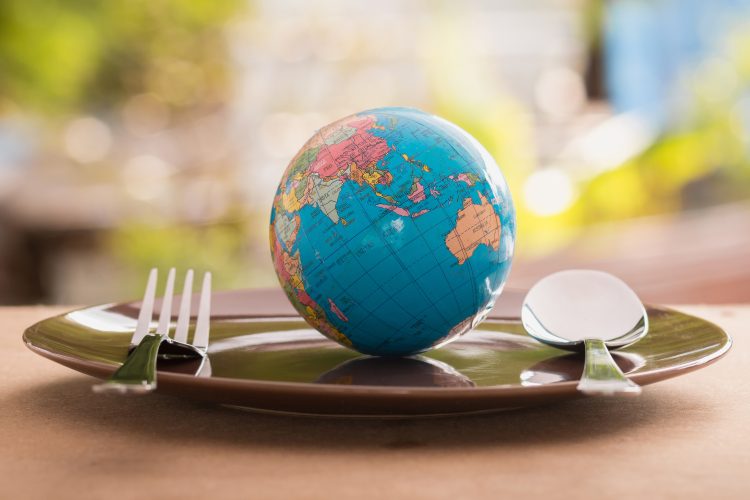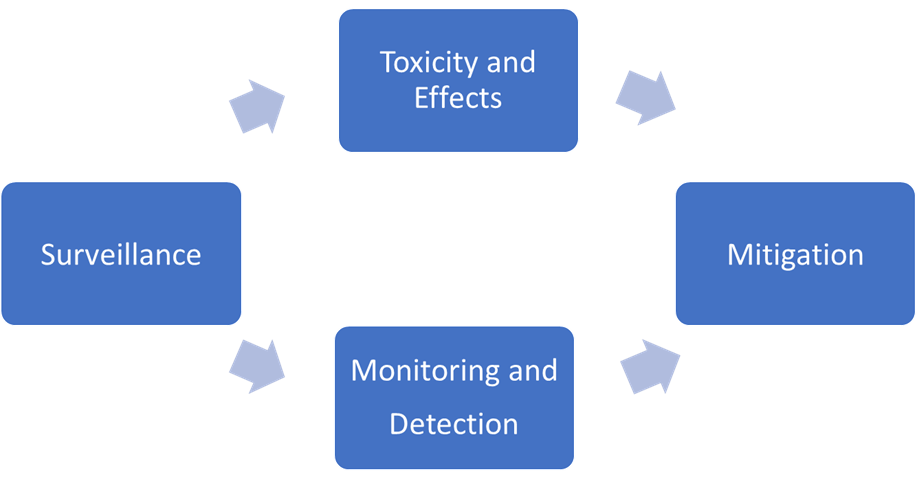Future guarding food
- Like
- Digg
- Del
- Tumblr
- VKontakte
- Buffer
- Love This
- Odnoklassniki
- Meneame
- Blogger
- Amazon
- Yahoo Mail
- Gmail
- AOL
- Newsvine
- HackerNews
- Evernote
- MySpace
- Mail.ru
- Viadeo
- Line
- Comments
- Yummly
- SMS
- Viber
- Telegram
- Subscribe
- Skype
- Facebook Messenger
- Kakao
- LiveJournal
- Yammer
- Edgar
- Fintel
- Mix
- Instapaper
- Copy Link
Posted: 12 April 2023 | Nitsara Karoonuthaisiri | 1 comment
Nitsara Karoonuthaisiri explains the role of the International Joint Research Center on food security in strengthening the ASEAN communities in an era of instability.


Food security impacts us all; driven by overpopulation and climate change, our global food supply is under severe threat.
To feed a population expected to grow to around 10 billion by 2050, the world will have to double its current food production. To make matters worse, according to the Food and Agriculture Organization (FAO), climate change has also been found to have an impact on food safety, particularly on incidences of foodborne disease and emerging contaminants.
Food insecurity and safety in Southeast Asian Nations
The prevalence of moderate to severe food insecurity in the ASEAN communities (10 Southeast Asian states comprising Brunei, Cambodia, Indonesia, Laos, Malaysia, Myanmar, the Philippines, Singapore, Thailand and Vietnam – some of the world’s key food producers) was 18.6 percent in 2019, leaving 122.6 million people in these areas without consistent access to food.
Food scarcity and poor food system infrastructure increase the consumption of contaminated food; approximately 52 million people in the ASEAN region fall ill each year after consuming unsafe foods.1 New approaches are needed to feed the current and future global population.
Mycotoxins
Food security is a global challenge, however, and as such requires worldwide collaboration.
With the common mission to overcome the global food security crisis, the International Joint Research Center on Food Security (IJC-FOODSEC) was established by Queen’s University Belfast, National Center for Genetic Engineering and Biotechnology (BIOTEC), and Thammasat University, Thailand.
Located at BIOTEC, Thailand, the IJC-FOODSEC has collaborated with a range of research institutes and universities around the globe to carry out projects that cover the various spectrum of food security challenges impacting the ASEAN region.
Our main focus is on food quality, safety and authenticity, and included within this remit we explore some of the emerging issues facing our future food (allergens, mycotoxins, pesticides, heavy metals), with particular emphasis on how these may affect alternative proteins.
Among a wide range of food security concerns, IJC-FOODSEC has identified mycotoxin contamination in the food chain as a priority. Mycotoxins are hazardous contaminants produced by toxigenic fungi.2 They are not only a serious global health issue, causing adverse effects on human and animal health (eg, carcinogenicity, hepatotoxicity, nephrotoxicity, neurotoxicity, immunotoxicity, and estrogenic effects), but they’re also damaging the global economy and international trade.3
Contamination of mycotoxins can be found at all stages throughout food crop supply chains, starting from planting (pre-harvest, harvest, post-harvest, or crop storage), all the way through to the production line and finished product.4
The contaminated levels depend on environmental conditions, nutritional components of crops, and infection of fungi at a farm.5 Climate change is expected to contribute towards the global increase of mycotoxins presence in foods, feeds and agricultural products due to varieties of fungal infection.6
The problems become more complex and serious due to the co-contamination of multiple hazardous mycotoxins in commodities and environment.
How IJC-FOODSEC intends to help
To avert mycotoxin issues in the future, IJC-FOODSEC is embarking on a research programme wherein the team will be surveilling known and emerging mycotoxins, investigating their effects on health, developing rapid and accurate monitoring and detecting methods, and identifying mitigation methods (See Figure 1).


The IJC-FOODSEC strives to provide support and solutions to stakeholders across the food supply chain, from farmers, to food processors and consumers. It embarks on many dimensions of food security through joint research and development, capacity building of R&D personnel and students, and collaborative research with the food and feed industries.
The core capabilities in food R&D and the world class facilities are consolidated under one roof; these include omics technologies such as transcriptomics, proteomics, metabolomics and microbiomics; a gut simulation model; microbiology and microarray facilities; a diagnostic development platform; and advanced analytical instruments like liquid-chromatography high-resolution mass spectrometry, HPLC combined with diode array detector, a fluorescent detector, and a charge aerosol detector.
At the macro level, Thailand is one of the world’s leading exporters of food products and specialises in farmed agriculture and seafood. In 2021, Thailand ranked 13th largest food exporter globally. The food industry has long propelled the country’s economic development through the value it adds to the agricultural sector and industrial supply chain.
The country hosts roughly 9,000 food processing companies. The agri-food is a key sector in ASEAN, providing jobs and supporting the local economies. According to a 2017 report by the FAO, the ASEAN region as a whole has increased agricultural productivity at an average annual rate of 2.2 percent a year since 1991.7
Key contributors have been the increased use of land, the role of agricultural research and development (R&D), and innovation systems. The region has made meaningful gains over the past few decades, and continues to be a food basket and one of the most productive agricultural economies in the world. The strategic location of the IJC-FOODSEC make it an investors’ gateway to ASEAN.
In 2020, the Thai Government announced that a Bio-Circular-Green (BCG) Model will be part of the national agenda for the country’s development. Food security is front and centre to drive the BCG economy. Thailand’s BCG Action Plan sets a vision to create sustainable and quality growth with science, technology and innovation, raising income and quality of life while maintaining a good balance of utilisation and conservation of biological and natural resources.
With the focus on addressing food security issues, IJC-FOODSEC will directly support the strategic BGC sectors, namely agriculture and food, and wellness and medicine. IJC-FOODSEC is committed to contributing towards the BCG model policy in three ways.
- Researching and developing the necessary areas to give way to a sustainable and advanced agri-food sector
- Increasing research personnel to serve the needs of the relevant industries
- By providing fully equipped frontier infrastructure that enable global collaboration, whilst ensuring credibility and visibility of Thailand among the international arena.
IJC-FOODSEC will be the key player in allowing the nation to deliver against its existing reputation and vision of being ‘the kitchen of the world’ for consumption and wellness.
Joining forces for a better future
The IJC-FOODSEC will undoubtedly evolve to address emerging problems on food security. Encountering climate-related losses and damages, the food and feed industries will need to be resilient. This will be achieved by improving productivity, ensuring food safety against emerging contaminations as a result of changes to the weather and production methods, and safeguarding traceability and authenticity due to fast-paced global trades.
Not only does IJC-FOODSEC strives to be an excellent centre that brings together experts and stakeholders, but it also positions itself as a training and reference hub for a myriad of cutting-edge technology platforms which have the potential to address food insecurity and the associated issues that come with it. We firmly believe it will help develop the next-generation of high-caliber scientists and technicians.
IJC-FOODSEC welcomes partners from both academic and private sectors to join forces in moving ahead in this common endeavour.
References
- ASEAN Food and Nutrition Security Report 2021 V.1
- Piotrowska 2021; Xie et al. 2022
- Marroquín-Cardona et al. 2014; Wu et al. 2014
- Kebede et al. 2020
- Sanchis and Magan 2004
- Magan et al. 2003; Liu and Van der Fels-Klerx 2021
- fao.org/3/bt099e/bt099e.pdf
About the author
Nitsara Karoonuthaisiri is a Senior Researcher and Head of the Microarray Laboratory at the National Center for Genetic Engineering and Biotechnology in Thailand. Upon finishing her BSc (Honours with Distinction) at Columbia University and MS and PhD in Chemical Engineering from Stanford University, she employed microarray technology to study an economically important black tiger shrimp and developed antibody arrays for diagnostics.
Related topics
Food Safety, Food Security, Health & Nutrition, Mycotoxins, Research & development
Related organisations
BIOTEC, Food and Agriculture Organization (FAO), International Joint Research Center on Food Security (IJC-FOODSEC), National Center for Genetic Engineering and Biotechnology (BIOTEC), Queen's University Belfast, Thammasat University










Great Article